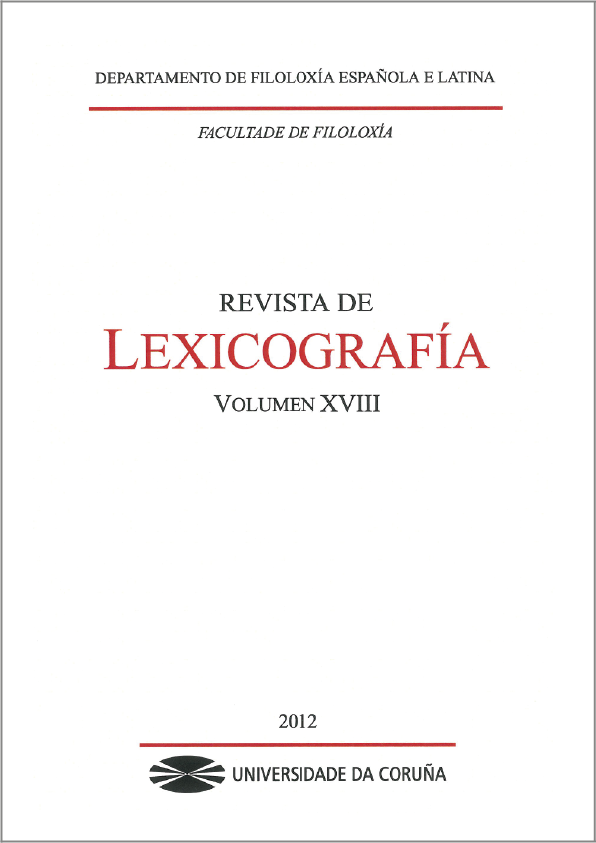Pedagogical approach in a proposed international trade electronic dictionary Spanish-English
Main Article Content
Abstract
The present article represents a part of a more comprehensive project which entails the proposal for the elaboration of an International Trade Dictionary inside the theoretical framework of the Functional Theory of Lexicography. This project, which will be presented as a Ph dissertation, proposes the creation of a specialized electronic pedagogical dictionary in English and Spanish for Spanish university students. What we present here is the summary of all those sections in the study which focus on the pedagogic approach of the proposed reference tool. Specifically we deal with the selection of information categories and the elaboration of two structural elements (Systematic Introduction and User’s Guide) since they are considered to be highly relevant for the user.
Within the framework of the Function Theory of Lexicography, this selection of categories can only be performed after defining accurately the type of user to whom the work is aimed at, together with the lexicographically relevant needs of the mentioned user and the social or extralexicographical situation where those needs will emerge. For this reason, after a brief overview of the state-of-the-arts, we summarize the theoretical framework where our proposal of a dictionary is included. Next, we state the pedagogical facts that justify our work and the objectives that we intend to meet. In a following section, we offer a list of the information categories and structural elements considered as relevant for our target user who has been defined as a student immerse in a learning process.
Finally, we present a set of illustrations showing the possible layout for the dictionary interface in different phases of the search process.
Keywords:
Downloads
Article Details
References
Andersen, Birger y Pedro A. Fuertes-Olivera (2009): «The Application of Function Theory to the Classification of Monolingual Business Dictionaries», Lexicographica 25, pp. 213-239.
Andersen, Birger y Richard Almind (2011): «The Technical Realization of Three Monofunctional Phrasal Verb Dictionaries», en P. A. Fuertes-Olivera y H. Bergenholtz, eds., E-Lexicography. The Internet, Digital Initiatives and Lexicography, London-New York, Continuum, pp. 208-229.
Bergenholtz, Henning (2011): «Access to and Presentation of Needs-Adapted Data in Monofunctional Internet Dictionaries», en P. A. Fuertes-Olivera y H. Bergenholtz, eds., E-Lexicography. The Internet, Digital Initiatives and Lexicography, London-New York, Continuum, pp. 30-53.
Bergenholtz, Henning y Sandro Nielsen (2006): «Subject-field components as integrated parts of LSP diccionaries», Terminology, 12, 2, pp. 281-303.
Bergenholtz, Henning, Sandro Nielen y Sven Tarp (2009): Lexicography at a Crossroads. Dictionaries and Encyclopedias Today, Lexicographical Tools Tomorrow, Bern, Peter Lang.
Bergenholtz, Henning y Sven Tarp (2003): «Two opposing theories: On H.E. Wiegand’s recent discovery of lexicographic functions», Hermes. Journal of Linguistics, 31, pp. 171-196.
Bergenholtz, Henning y Sven Tarp (2004): «The concept of dictionary usage», Nordic Journal of English Studies, 3, pp. 23-36.
Bergenholtz, Henning y Sven Tarp (2005b): «Electronic dictionaries: Old and new lexicographic solutions », Hermes. Journal of Linguistics, 34, pp. 7-9.
Bothma, Theo J. D. (2011): «Filtering and Adapting Data and Information in an Online Environment in Response to User Needs», en P. A. Fuertes-Olivera y H. Bergenholtz, eds., E-Lexicography. The Internet, Digital Initiatives and Lexicography, London-New York, Continuum, pp. 71-102.
Fernández, Trinidad y Pamela Faber (2011): «The Representation of Multidimensionality in a Bilingualized English-Spanish Thesaurus for Learners in Architecture and Building Construction», International Journal of Lexicography, 24, 2, pp. 198-225.
Fuertes-Olivera, Pedro A. (2010): «Lexicography for The Third Millennium: Free Institutional Internet Terminological Dictionaries for Learners», en P. A. Fuertes-Olivera, ed., Specialised Dictionaries for Learners, Berlin-New York, De Gruyter, pp. 193-210.
Fuertes-Olivera, Pedro A. y Ascensión Arribas-Baño (2008): Pedagogical Specialised Lexicography. The representation of meaning in English and Spanish business dictionaries, Amsterdam-Philadelphia, John Benjamins (Terminology and Lexicography in Research and Practice, 11), pp. 45-69.
Fuertes-Olivera, Pedro A. y Henning Bergenholtz (2011): «Introduction: The Construction of Interner Dicionaries», en Pedro A. Fuertes-Olivera y Henning Bergenholtz, eds., ELexicography. The Internet, Digital Initiatives and Lexicography, London-New York, Continuum, p. 3.
Fuertes-Olivera, Pedro A. y Henning Bergenholtz, eds. (2011): E-Lexicography. The Internet, Digital Initiatives and Lexicography, London-New York, Continuum.
Fuertes-Olivera, Pedro A. y Sven Tarp (2011): «Lexicography for The Third Millennium: Cognitiveoriented Specialised Dictionaries for Learners», Iberica. Journal of the European Association of Languages for Specific Purposes, 21, pp. 141-162.
Gouws, Rufus H. (2011): «Learning, Unlearning and Innovation in the Planning of Electronic Dictionaries», en P. A. Fuertes-Olivera y H. Bergenholtz, eds., E-Lexicography. The Internet, Digital Initiatives and Lexicography, London-New York, Continuum, pp. 17-29.
Heid, Ulrich (2011): «Electronic Dictionaries as Tools: Toward An Assesment of Usability », en P. A. Fuertes-Olivera y H. Bergenholtz (eds.), E-Lexicography. The Internet, Digital Initiatives and Lexicography, London-New York, Continuum, pp. 287-304.
Landau, Sidney I (2001): Dictionaries: The Art and Craft of Lexicography, Cambridge, Cambridge University Press.
Lew, Robert. (2011): «Online Dictionaries of English», en P. A. Fuertes-Olivera y H. Bergenholtz (eds.), E-Lexicography. The Internet, Digital Initiatives and Lexicography, Londres-Nueva York, Continuum, pp. 230-250.
Nielsen, Sandro y Richard Almind (2011): «From data to dictionary», en P. A. Fuertes-Olivera y H. Bergenholtz, (eds.), E-Lexicography. The Internet, Digital Initiatives and Lexicography, London-New York, Continuum, pp. 141-167.
Nielsen, Sven y Sven Tarp, eds. (2009): Lexicography in the 21st Century. In Honour of Henning Bergenholtz, Amsterdam-Philadelphia, John Benjamins (Terminology and Lexicography in Research and Practice, 12), pp. ix-xi.
Tarp, Sven (2008): Lexicography in the Borderland between Knowledge and Non-Knowledge. General Lexicographical Theory with Particular Focus on Learner’s Lexicography, Tübingen, Niemeyer.
Tarp, Sven (2010): «Functions of Specialised Learners’Dictionaries», en Pedro A. Fuertes- Olivera, ed., Specialised Dictionaries for Learners, Berlin-New York, De Gruyter, pp.39-54.
Verlinde, Serge (2011): «Modelling Interactive Reading, Translation and Writing Assistants », en P. A. Fuertes-Olivera y H. Bergenholtz, eds., E-Lexicography. The Internet, Digital Initiatives and Lexicography, London-New York, Continuum, pp. 275-286.
Zgusta, Ladislav (1971): Manual of lexicography (Janua Linguarum. Series maior 39).Prague-The Hague-Paris, Academia-Mouton.


